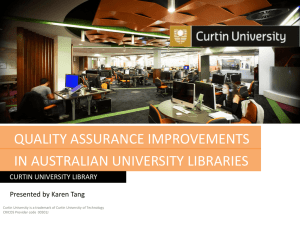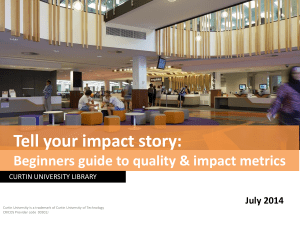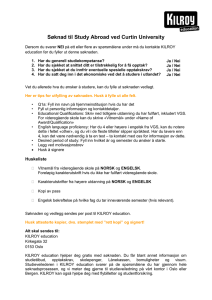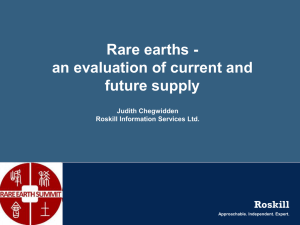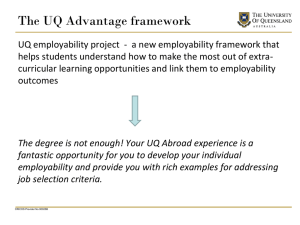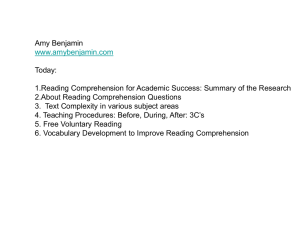DJK-China-IM-Sept-2013-V3
advertisement
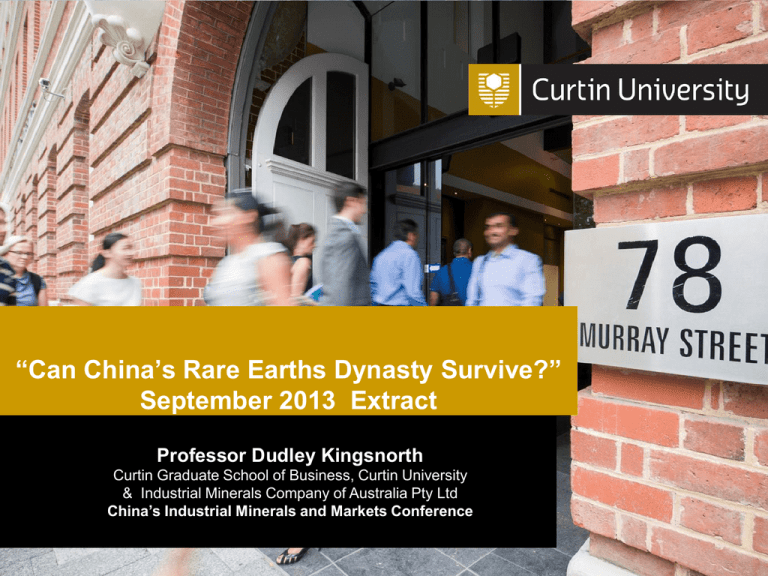
“Can China’s Rare Earths Dynasty Survive?” September 2013 Extract Professor Dudley Kingsnorth Curtin Graduate School of Business, Curtin University & Industrial Minerals Company of Australia Pty Ltd China’s Industrial Minerals and Markets Conference Disclaimer (“Forward Looking Statements”) The statements in this presentation represent the considered views of the Industrial Minerals Company of Australia Pty Ltd (IMCOA) and the Office of Research & Development at Curtin University (“Curtin”), Western Australia. It includes certain statements that may be deemed "forward-looking statements." All statements in this presentation, other than statements of historical facts, that address future market developments, government actions and events, are forward-looking statements. Although IMCOA and Curtin believe the outcomes expressed in such forward-looking statements are based on reasonable assumptions, such statements are not guarantees of future performance and actual results or developments may differ materially from those in forward-looking statements. Factors that could cause actual results to differ materially from those in forward-looking statements include new rare earth applications, the development of economic rare earth substitutes and general economic, market or business conditions. While, IMCOA and Curtin have made every reasonable effort to ensure the veracity of the information presented they cannot expressly guarantee the accuracy and reliability of the estimates, forecasts and conclusions contained herein. Accordingly, the statements in the presentation should be used for general guidance only. Curtin University is a trademark of Curtin University of Technology CRICOS Provider Code 00301J 2 IMCOA Disclosure Professor Dudley J. Kingsnorth, through the Industrial Minerals Company of Australia Pty Ltd (“IMCOA”) and Curtin University provides rare earths market and project development advice to a number of rare earths consumers and producers This advice is provided on a fee for service basis; with no success or promotional fees or obligations. There are Confidentiality Agreements in place with many of these companies, but this does not preclude comment on the public information available on these companies. Neither Professor Kingsnorth nor IMCOA own any securities in rare earths companies. Similarly, Professor Kingsnorth does not hold any executive or nonexecutive positions in any company associated with the critical materials sector. Curtin University is a trademark of Curtin University of Technology CRICOS Provider Code 00301J 3 IMCOA Total Rare Earths Demand 2004 to 2012 Estimated Global Rare Earths Demand 2004 to 2012 (t REO ±20%) (Source: IMCOA-Curtin and Rare Earths Industry Stakeholders) Year China Japan + N.E. Asia USA Europe + Others Total China’s Share 2004 38,000 26,000 14,000 12,000 90,000 42% 2006 60,000 26,000 13,000 11,000 110,000 55% 2008 70,000 28,000 15,000 11,000 124,000 56% 2010 74,000 24,500 15,000 9,500 123,000 60% 2012 74,000 18,000 17,000 6,000 115,000 64% 4 Demand and Supply for Rare Earth Groups in 2012 (±20%) Rare Earth Oxide Group Light Rare Earths (La, Ce. Pr & Nd) Medium Rare Earths (Sm Eu Gd) Heavy Rare Earth (Tb, Dy, Er & Y) 5 Demand: Tonnes REO Global 102,500t China 64,500t (63%) Production: Tonnes REO Global China 98,500t 3,500t 2,500t 2,000t (80%) 4,000t 2,250t (90%) 10,000t 7,500t 75% 7,500t 7,250t (95%) Forecast Rates of Growth 2013-2016 (Note: 1. Now that Mountain Pass and Mt Weld are scheduled to be in production at their Phase 1 design capacities in early 2014 IMCOA is of the view that there could be renewed interest in rare earths, given the associated diversity of supply. 2. The Forecasts below are based on current trends) Forecast Global Growth Rates 2013 to 2016 Application Growth between 2013-2016 with Comments Catalysts Steady growth at 4-6%pa 2013 to 2016, which IMCOA believes may improve with better availability and lower cerium and lanthanum prices Glass Minimal growth in 2012; as more cerium becomes available in 2013 to 2016 growth at 4-6%pa Polishing Huge growth in 2010/11 due to polishing needs of touch screens, high prices tempered growth in 2011/12. Growth at 510%pa 2013 to 2016, but could be greater with lower cerium prices Metal Alloys The biggest unknown is the rate of take-up of Li-ion batteries. IMCOA forecasts growth 2013 to 2016 at 6-12% Magnets Price and availability a constraint. Forecast growth 2013 to 2016 of 8-12%pa; which could be greater if more of the rare earths used in permanent magnets were to become available on a long term sustainable basis, at reasonable prices. Phosphors (including Pigments) The new lighting devices , television and computer screens use less rare earths as a result there are now clear signs that demand is static. Pigments for plastics, textiles and cosmetics is a high growth sector. Recently, IMCOA has modified overall forecast growth rates to 0-4%pa, but the market may well contract if the current trend continues. Ceramics Steady growth rates at historic rates of 4-6%pa Other The use of cerium for water purification is included as a high growth application. Other new applications could include use of Gd in refrigeration. Growth rate of 6-10% 2015 to 2016 Compound Average Rate of Growth Following a minor recovery in demand of 5% in 2012, IMCOA forecasts a CAGR for 2013-16 of 6-12%%pa, marking a recovery as alternative supplies to China come on-line. However, if China restricts the export of HREEs then this rate of growth would be constrained. Curtin University is a trademark of Curtin University of Technology CRICOS Provider Code 00301J 6 IMCOA The Outlook to 2016 Will China be more transparent with its intentions/forecasts? China will not directly deny rare earths to ROW; but it will continue to take the measures necessary to maximise ‘value add’ within China. Consolidation of Chinese industry will continue. Impact of Baotou Rare Earths Trading Platform could become significant and set a global pricing benchmark. With a greater diversity of supply; R&D in ROW will switch from the 3Rs to developing new applications and more efficient processing. The supply of heavy rare earths will remain a concern Curtin University is a trademark of Curtin University of Technology CRICOS Provider Code 00301J 7 IMCOA Rare Earths Market: 2013 to 2016 Demand Year Total China Supply China Share ROW Total China China Share ROW 2013f 125,000t 85,000t 68% 40,000t 122,500t 100,000t 82% 22,500t 2014f 136,000t 91,000t 67% 45,000t 143,000t 105,000t 73% 38,000t 2015f 148,000t 95,000t 64% 53,000t 161,000t 110,000t 68% 51,000t 2016f 160,000t 99,500t 62% 60,500t 182,500t 115,000t 63% 67,500t Curtin University is a trademark of Curtin University of Technology CRICOS Provider Code 00301J 8 IMCOA Supply & Demand Trends 2016-2020 Demand in 2020: 200-240,000tpa REO. Demand trends: Greater availability of non-Chinese products. Greater total supply chain management . Growth will be limited until new ROW producers are proven. Supply in 2020: 240-280,000tpa REO Supply trends: Availability of HREEs will remain an issue. Ongoing consolidation of industry worldwide. Will low iron ore prices impact on the viability of Baogang? Long Term Prices: US$50-70/kg REO (weighted average consumption basis) Curtin University is a trademark of Curtin University of Technology CRICOS Provider Code 00301J 9 IMCOA Potential Impacts on Rare Earths Demand Forecasts 1. Slower take-up of Li-ion batteries by the automotive sector. 2. Rapid growth in demand for Ce-based water and waste treatment. 3. Demand for rare earth magnets increases to 20-25%pa due to increased supply (<US$75/kg Nd2O3) 4. Contraction in demand for phosphor rare earths due to rapid takeup of LEDs. 5. Combination of 1-3 could increase demand in 2020 >250kt REO Curtin University is a trademark of Curtin University of Technology CRICOS Provider Code 00301J 10 IMCOA The Outlook for Rare Earths in 2020 Technology will be the key to new projects and new applications. ROW consumers will be able to look forward to a sustainable supply of light rare earths – new applications will be developed with confidence. The supply of heavy rare earths will remain critical for the foreseeable future. Supply of neodymium will be critical – to support growth of 15-25%p.a. the price will need to be <US$75kg Nd2O3 The supply of heavy rare earths (Eu, Tb and Y) will remain critical until heavy new rare earth projects are successfully developed outside China. Curtin University is a trademark of Curtin University of Technology CRICOS Provider Code 00301J 11 IMCOA Any Questions? Professor Dudley J. Kingsnorth Curtin University Executive Director, Industrial Minerals Company of Australia Pty Ltd Curtin University is a trademark of Curtin University of Technology CRICOS Provider Code 00301J 12 IMCOA

